Have you ever wondered what differentiates between web hosting and reseller hosting and how both can be important to your online efforts?
In this comparison, we shed some light on the main differences between the two fundamental types of hosting services regarding features, benefits, and uses.
Whether you are an individual who wants to start a personal website or a business that is focused on hosting services for others, you need to know the differences between them to make good decisions in the digital world.
I. Introduction
A. Definition of Web Hosting
Web hosting is a service that would actually allow an individual or an organization to post their site on the World Wide Web. You are simply renting server space and resources from a hosting provider, who stores website files and data on those servers.
This, therefore, means that whenever a visitor has typed the domain name of the site to his web browser, the hosting server had consequently sent the requested files to the visitor, which was then made visible and accessible on the browser.
In fact, each of these has some of the following components in a comprehensive definition of web hosting:
Server Space: Web hosting provides some portion of the server either virtually or physically, where the files, databases, and all other resources related to the website are housed.
Server space for the site has very important materials, for this is where all the site materials, like HTML pages, images, videos, and scripts, are located.
Bandwidth: Most hosting services give an amount to the user. Bandwidth denotes the data transfer level between the server and the site visitor browsers.
It ensures that websites load fast and effectively, mostly during peak hours.
Domain Name Management: Most web hosting providers offer services that allow customers to register a new domain name or enable users to point an existing domain name toward their hosting account.
Domain names are the unique address through which visitors access a website (e.g., www.example.com).
Server Management: The hosting company manages servers, which involves maintaining them, updating security, and providing technical support.
Website owners are relieved of this burden. Server management requires software installation, monitoring, and all necessary things to troubleshoot any problems that arise with servers.
Email hosting: Most web hosting packages offer email hosting services that allow customers to set up and manage email accounts with the domain name (e.g., [email protected]).
Most webmail interfaces, such as Outlook or Thunderbird, can be easily accessed or configured with an email client.
Security: Web hosting companies assure tight security for websites against any cyber threat, including malware, hacking, and DDoS attacks. Some of the features include firewalls, SSL certification for data transits, and regular data backup to avoid data loss on their servers.
B. Definition of Reseller Hosting
In simpler terms, reseller hosting is a type of web hosting in which an account owner uses his or her given space and bandwidth on the hard drive to host websites on behalf of others.
In this arrangement, the reseller buys hosting services from a larger hosting provider and further resells these hosting services to his customers, typically under his brand name.
Here's a detailed breakdown of the components and workings of reseller hosting:
Hosting infrastructure: In reseller hosting, server space, bandwidth, and other resources are rented from a more extensive web hosting or data center company.
They are usually bought in bulk at a significantly discounted rate.
Reseller Account: A reseller hosting account in which the reseller obtains a given amount of disk space, bandwidth, and other features by the paid-for package from the hosting provider.
Flexibility for branding: Generally, resellers have flexibility in branding the hosting service they resell using their company's name, logo, and branding elements.
Establishing a unique name for their hosting business allows them to have their own hosting business.
Custom Resource Allocation: The reseller will have the authority to divide further and allocate resources purchased between his clients.
This will allow him to create hosting plans for individual customers containing different limits for them and under-selling the plans.
Customer Management: For customer account management, the reseller must undertake activities like creating accounts, providing technical support, and handling billing and invoicing.
Technical Support: Although the reseller is usually responsible for providing his clients with basic technical support, he may rely on the hosting provider's support personnel for questions related to server maintenance, issues concerning software updates, and just about every kind of technical trouble.
Billing and Pricing: The reseller develops his own pricing and billing structure for the hosting services offered.
In other words, the reseller can decide to bill his client monthly, quarterly, or even yearly. He can also devise other discount or promotion packages to attract more clients.
White Label Options: Some reseller hosting comes with white label options.
They allow the reseller to rebrand the hosting control panels and other interfaces with his company brand.
This gives the impression that the reseller offers to host himself directly and not resell it from another third party.
II. Key Features of Web Hosting
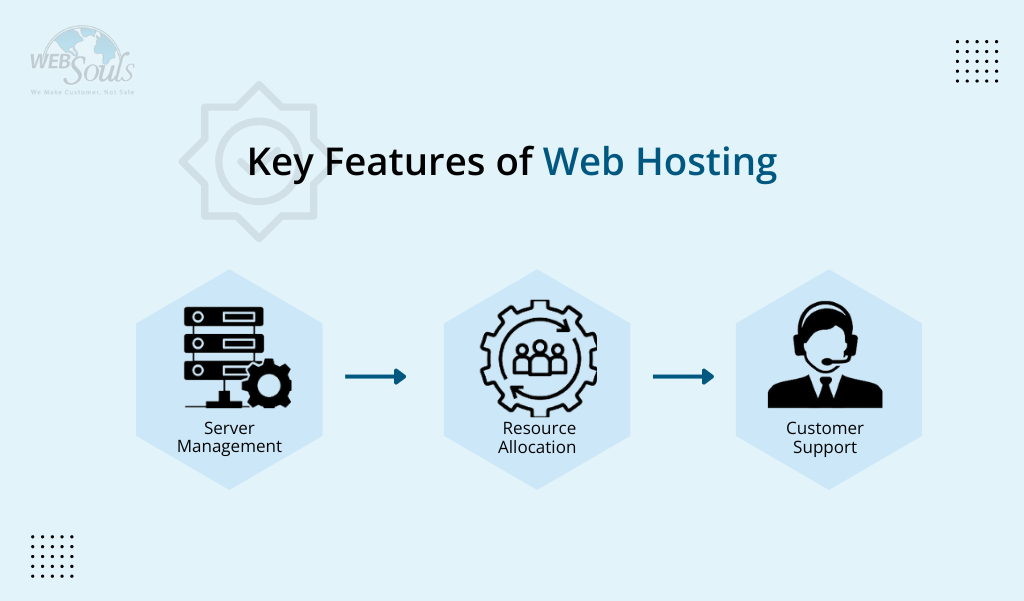
A. Server Management
Web hosting encompasses several vital features essential for its smooth operation.
Key in server management includes hardware management, which is to physically keep the structure in prime condition and quickly repair and replace any failed components. Hence, upgrades will also be undertaken wherever needed.
Equally important will be the setup and configuration of software. The host will be responsible for setting up and configuring core software that includes the operating system and the web server, among many others, in order that the website and its application software runs in an expected manner.
It is also very important to mention that the security measures are turned on in order to ensure the security of the server and hosted sites from any kind of malware, attempts of hacking, DDoS attacks, and other related threats.
This shall cover the configuration of firewalls; systems to detect unauthorized entry; scan for malware; and update patches system-wide, which shall harden the system from vulnerabilities.
These are the activities that are constantly being carried out, monitoring of the server's performance, its uptime and etc to carry out resources measurements of the server, and that includes network connectivity so that the performance and quality of the server are reliable.
These will be in place to check or recover data that could be lost in the course of operations.
Various backup methods and disaster recovery plans are offered to restore data quickly in such difficulties.
B. Resource Allocation
Web hosting plans come with several key features necessary for hosting sites optimally.
First, disk resources are arranged to store website files, databases, e-mails, and other related data.
This ensures that there is no bottleneck in the network design and that the storage capacity is fit for the resources and content amount needed by the hosted websites.
Another important component is bandwidth, which refers to the amount of data between the server and web browsers of the visitors using their websites.
According to the guiding rules that the plan stipulates, therefore, hosting would contain some bandwidth level allocated for each plan.
In addition, it makes a share in the memory and CPU allocation between the hosting users through a separate account to provide proper performance and response time.
Most of the time, the pricier hosting plans come with more CPU cores and added RAM, the very ones that can be well-suitable for hosting certain types of websites or running system-intensive cloud-based applications.
Hosting plans are also equipped with the number of websites or domains allowed in one account.
Some will help you make and host several websites, while others may be limited to hosting a number of domains.
Thus, the user of a different website can find the optimal solution, according to his or her needs, without overreaching or falling afoul of the standards and expectations of the profession.
In addition, it allows client panel access that permits customers to have a simplified form of access to their hosting accounts for management.
These include tools to create email addresses, attending to databases, installing applications, and receiving server logs through interfaces that are provided by control panels like cPanel, Plesk, and custom-built.
Customers can take charge and create a robust environment to meet their requirements.
C. Customer Support
Besides the necessary elements included in hosting plans, customer support services are another service that a web hosting company offers their customers so that both can visit the website smoothly.
Technical support is essential to hosting services because it solves server-related issues and code errors, troubleshoots website problems, and answers technical problems.
A support team may take care of customers via ticketing systems, chat, e-mails, or phone calls, incorporating the customers with various outlets for solutions.
Moreover, many hosting firms have around-the-clock server monitoring, guaranteeing uninterrupted service and enhanced performance linkages.
Thus, proactive measures will enable hosting companies to be prompt in dealing with and solving any problems, including server downtime, diminution of performance, or security breaches.
Therefore, they can avert any disturbance hosts may experience and ensure optimal performance.
For the most part, hosting companies furnish full-fledged knowledgebase; FAQs, tutorials, and documentation that help customers solve their general problems, configure the hosting services independently, and learn the best website management practices.
Hence, this self-service channel empowers customers to find answers to their struggles fast and discreetly.
In addition, many hosting providers have social interactions.
These platforms vary from their host forums and discussion boards, which buyers use to share questions, tips, and hints and seek advice from the host or experienced users.
Traveling neighborhood sessions facilitate inter-customer collaboration and knowledge sharing, creating an amicable environment that favors troubleshooting and learning.
Some companies providing these services may offer SLAs (Service Level Agreements) to their customers, ensuring a specific uptime level, good performance, and response time for their orders.
SLAs enumerate the provider's engagements and the remuneration or penalty for not meeting them, hence giving customers a guarantee regarding the quality of service that is likely to be rendered.
III. Key Features of Reseller Hosting
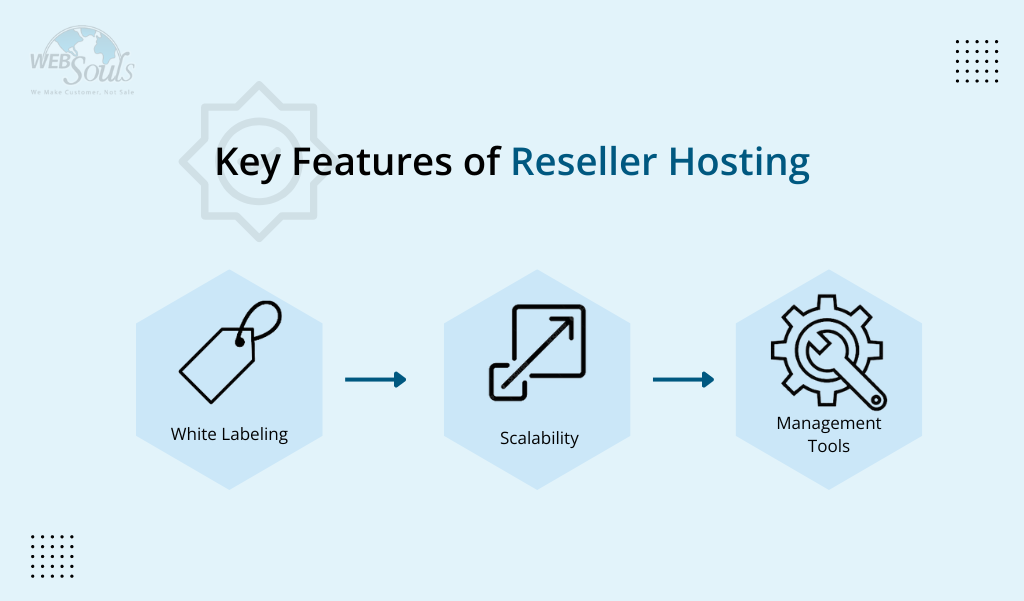
A. White Labeling
Reseller hosting has in-built embedded features that are solution-driven to startups to big companies that are either extending their services or starting a service cloud proprietor journey.
Highlighting the fact under reseller hosting is exactly white labeling. Selling as white label grants resellers freedom of renaming the hosting services they re-sell, with their own company name, logo and brand similarities.
By using their custom branding as white labels, resellers can build their own hosting business identity independent of the master hosting provider's identity, thereby ensuring clients' confidence and reliability.
And most importantly reseller hosting comes with the opportunity to use custom nameservers using the reseller's domain name.
This is also an added option for white-labeling, as domain queries don't expose the hosting provider's identity thus reinforcing a reseller brand across this domain.
On the other hand, the typical reseller hosting packages allow you to personalize the control panel interface with the reseller's branding in addition to the panel.
This private labeling of the control panel enables resellers' customers to work with hosting settings using a branded interface which is the same as the reseller thus correlating accordingly with the reseller's brand and culminating with overall user experience provision.
B. Scalability
Scalability in reseller hosting is partially defined or achieved through the flexible use of resources.
A system of reseller hosting plans usually includes resources that can be estimated, for instance, disk space, bandwidth, or number of hosting accounts.
By that, resellers are allowed to quickly adapt their plans according to the altering order of needs for their own sake or that of their clients.
Regardless of whether the web traffic jumps up suddenly or a new client is added they can adjust and meet the demand by either adding more or downscaling their hosting plans according to what they need for the time being.
Additionally, reseller hosting providers use flexible resource allocation among other things, which are chosen by customers as follow-ups to further optimize scalability.
Other services included here may be domain registration, certificates of SSL, and hosting of mail, for example.
Resellers do not only have the technical equipment but also offer their panoply of services as optional add-ons.
With this strategy, resellers can expand their market share and generate guaranteed revenue while at the same time; their clients are served in a way that is not only effective but also efficient.
Thereby, some reseller hosting providers also make reseller plans with multiple levels (or tiers) containing different resource allocations.
And they adjust the prices accordingly. These tiered reseller plans or tiers give resellers the liberty to pick the one with the feature required by them currently and upgrade to the next plan when their business grows.
Upgrade to a higher-tier plan for a more resource-abundant package or use toolkits and priority support can make resellers customize their overall hosting solutions in line with their interim and their clients’ needs.
C. Management Tools
Reseller hosting provides a set of user-friendly management tools engineered to give resellers a firm grip on the task of handling their hosting business activities completely and supporting their clients professionally at the same time.
What comes next is the Reseller Ctrl Panel. It is a tool to manage billing, customer support, and many more hosting services.
It gives a handheld interface to the reseller which in turn helps them manage their clients' hosting accounts, create hosting packages, allocate resources, and perform multiple administrative tasks.
With the Reseller Control Panel, the resellers are in control of the whole hosting infrastructure and they can shape the services in a way to be perfect for the unique demands of every client.
In a nutshell, these tools are the main constituents of the reseller platforms for billing and invoicing purposes.
They automate tasks such manage the payments of customers, creating invoices and handling account transactions.
The process of invoice automation will effectively assist in the smooth running of financial operations and make sure that customers make on-time payments, a fact that would have a positive effect on the overall business effectiveness.
Moreover, reseller hosting consoles usually support customer management tools. Resellers can create, delete, or delete hosting accounts from the right panel directly, revise user passwords, and manage access to full control over the hosting accounts.
By providing them with this, resellers will have the ability to timely and correctly handle their customers' accounts as well as to address any questions or inquiries that can come as a result of a transaction.
Utilizing monitoring and reporting tools is beneficial for resellers if it comes to tracking server performance, resource usage, as well as uptime statistics for hosting accounts.
They provide resellers with the capacity of being able to identify and take action to rectify any problems that might cause downtime or unpredictable performance of their customers' websites, thus maintaining appropriate system usage.
Also, reseller hosting providers mostly are provided with technical support to help resellers make proper server configurations, fix any arising issues, and answer client questions.
It may come in many different variations such as ticketing systems, live chat, and phone.
On the other hand, email is also one of the forms that a support staff provides whenever a reseller faces a difficulty.
By doing so, the resellers can communicate using different channels to get the help they need to make their hosting business run.
In brief, the thorough management colloquy features offered by reseller hosting enable resellers to exert consequential interference in running their hosting company as well as in providing potent support to their clients and attaining impressive growth.
IV. Comparison of Web Hosting and Reseller Hosting
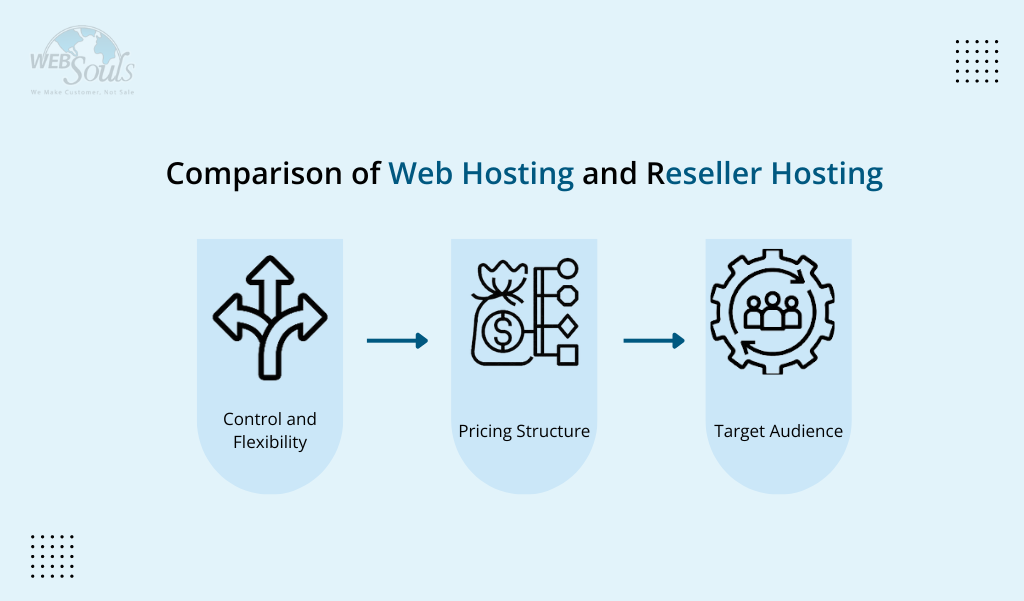
A. Control and Flexibility
Web Hosting:
Control: With standard web hosting, users typically have limited control over server settings and configurations. They rely on the hosting provider to manage the infrastructure and server resources.
Flexibility: Web hosting plans offer limited scalability and customization options. Users may have access to a control panel for managing their website settings and configurations, but they have less control over the underlying server environment.
Reseller Hosting:
Control: Reseller hosting provides greater control and flexibility compared to standard web hosting. Resellers can customize hosting packages, allocate resources, and configure server settings for their clients.
Flexibility: Reseller hosting allows for scalability and customization, enabling resellers to tailor hosting plans to meet the specific needs of their clients. Resellers have more control over the server environment and can offer additional services such as domain registration and SSL certificates.
B. Pricing Structure
Web Hosting:
Fixed Cost: Disk space, bandwidth, and the quantity of websites hosted are among the criteria that determine the set pricing structures of web hosting plans. Users pay a set monthly or annual fee for the hosting services.
Limited Scalability: While some web hosting plans offer scalability options, users may face limitations on resource allocation and upgrades, which could result in additional costs for higher-tier plans.
Reseller Hosting:
Tiered Pricing: Reseller hosting plans often have tiered pricing structures based on the number of hosting accounts, disk space, and bandwidth allocated. Resellers pay a base fee for the hosting package and may incur additional charges for add-on services or exceeding resource limits.
Scalable Resources: Reseller hosting offers greater scalability compared to standard web hosting, allowing resellers to easily upgrade or downgrade their plans based on their needs and the requirements of their clients.
C. Target Audience
Web Hosting:
Individuals and Small Businesses: Standard web hosting is suitable for individuals, bloggers, small businesses, and startups looking to host a single website or a small number of websites with basic requirements.
Limited Technical Expertise: Web hosting is ideal for users with limited technical knowledge or those who prefer a hands-off approach to managing their hosting environment.
Reseller Hosting:
Web Designers and Developers: Reseller hosting is popular among web designers, developers, and agencies who want to offer hosting services to their clients as part of a comprehensive web development package.
Entrepreneurs and Startups: Reseller hosting is also suitable for entrepreneurs and startups looking to start their own web hosting business without investing in infrastructure or technical expertise.
Advanced Users: More experienced users who need more control over resource allotment, server configurations, and branding options will find reseller hosting appealing.
V. Pros and Cons of Web Hosting
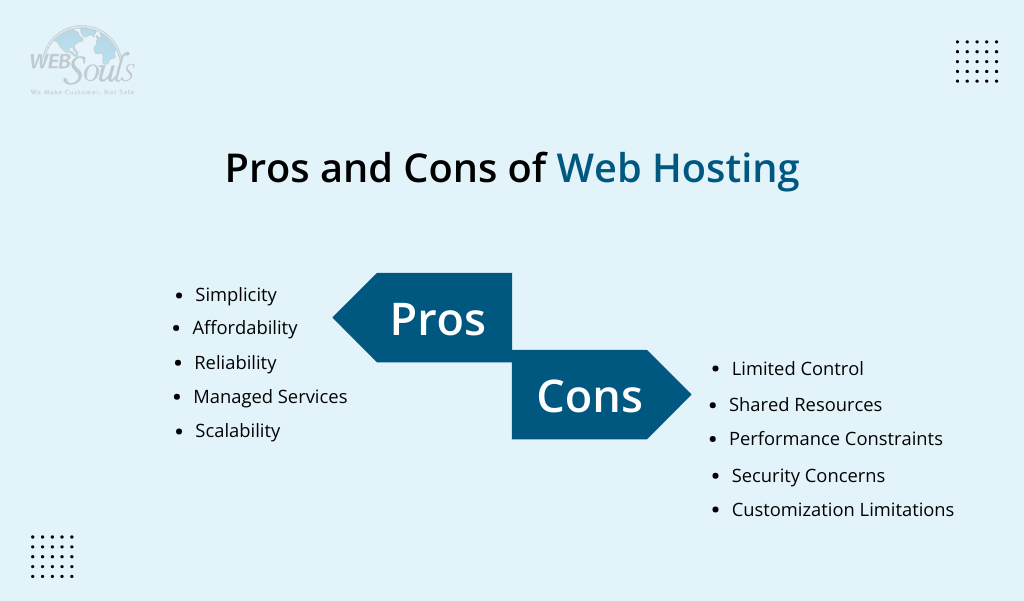
A. Pros
Simplicity: Pakistani Web hosting itself generally is not more complicated than establishing your website utilizing average knowledge about technology, which is a plus for home pages and small businesses.
Affordability: At this entry-level, most web hosting providers offer budget-friendly plans, which can suit small businesses as well as individuals who are operating on a shoestring budget.
Managed Services: Web hosting firms usually provide managed services, which take care of administrative duties like server maintenance, security upgrades, and support, so website owners have less work to perform.
Scalability: A number of web hosting packages come with scalability options, enabling users to step up and switch to the next plan as the amount of traffic their site receives and the resources required rise
Reliability: Respected supply companies say they offer reliable uptime guarantees, which keep websites operating and on the visitor's radar 24/7.
B. Cons
Limited Control: For the standard user, the control over server settings and configurations is focused on the initial step that can be quite restrictive for advanced users with precise requirements.
Shared Resources: With shared hosting environments, one site will be sharing server resources with other users which could in turn lead to degraded performance if the sites near one's own are getting too much traffic or resource depletion.
Performance Constraints: Shared IP bottlenecks and the low capacity of shared servers often cause sites to load slower and suffer performance issues when there is a high amount of activity.
Security Concerns: Security threats are unveiled as a result of shared hosting environments, possibly the vulnerability of one website may end up with other websites on the same server being affected through this process.
Customization Limitations: Web hosting service plans include a few features that tend to prevent users from installing different software or making necessary advanced settings.
VI. Pros and Cons of Reseller Hosting
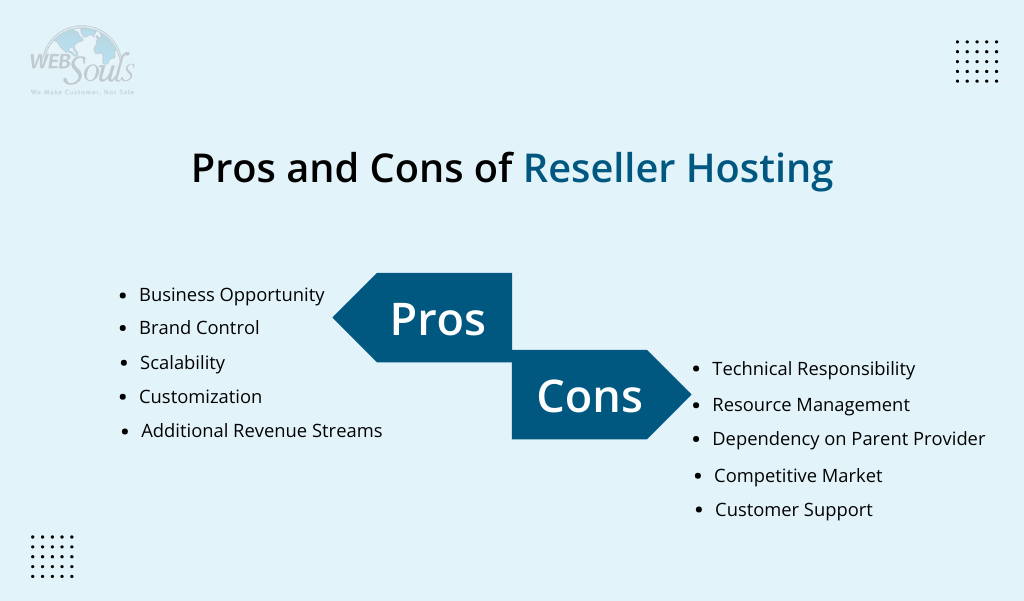
A. Pros
Business Opportunity: Kindly banderol the given sentence. The reseller hosting model enables entrepreneurs and web experts to kick-start their web hosting ventures with cheerless a huge initial investment.
Brand Control: Resellers can contact and offer brand and hosting services under their own brand name, logo and the brand identity elements adding more brand power and value of customers.
Scalability: Reseller hosting plans are suitable for resellers, since these plans offer the possibility of adding (scaling) packages should the business needs change and clients' presence increase.
Customization: Servers that resellers manage give them comparatively more leeway on configurations, resource distribution, and offering, providing them the ability to fine-tune the services according to the unique requirements of their customers.
Additional Revenue Streams: Apart from selling the hosting itself, the reseller is also capable of offering other services such as registration of domain names, installation of SSL certificates, and setup of e-mail hosting, which represents a new source of income.
B. Cons
Technical Responsibility: Agents are to handle their customers' accounts while providing technical assistance and billing/ invoicing facilities which can be quite demanding and complex to perform.
Resource Management: Along with the server management and resource allocation of the multiple clients can be difficult, mostly during the few hours of high traffic or resource-intensive tasks.
Dependency on Parent Provider: Reseller hosting is a model that uses the parent hosting provider's infrastructure and reliability. Therefore, if the parent provider runs into issues, then downtime or general customer satisfaction could be affected regarding the reseller.
Competitive Market: Actually, the internet hosting industry is a very competitive one, with lots of resellers competing for potential clients’. It will be easy for the new resellers to make a difference and build a strong clientele, but probably not.
Customer Support: Resellers have to maintain the after-sale services for their clients which may take a toll on them to increase their resources and provide adequate training necessary to offer quality support services.
VII. Use Cases and Applications
A. Web Hosting Use Cases
Web hosting serves a variety of purposes, catering to diverse needs and facilitating various types of websites:
People use web hosting services to construct their sites or weblogs, enabling them an opportunity to express their feelings, impressions, and interests to others.
This networking ability has one result: people can make others see them and interact with them online.
Small businesses are getting into the web hosting venture to establish an online presence and showcase their services to the targeted audience.
Web hosting is a key component of businesses as it allows customers to get first-hand insight into the company and its services, as well as extends their reach in the digital market.
E-commerce websites are enabled by web hosting to offer secure transaction platforms, sell products or services to users, and hence, affect consumer behavior and shopping patterns.
Web hosting ushers in the infrastructure that enables the e-commerce necessities having embedding products, shopping carts, and secure payment into consideration.
Creators, including artists, photographers, and designers, display their projects by web hosting their portfolios.
Web hosting allows you to have your portfolio archived digitally which will attract clients judging by your talent and creativity, which will see you reach a whole new level of global participation.
Companies and agencies take advantage of website hosting to establish knowledge-based sites, where audiences can access the information, news, and updates.
Academic institutions, NGOs, and government offices sign into web hosting for the education of people and engage with interested people.
The web hosting platform provides a great platform for users, with popular Content Management Systems (CMS), WordPress, Joomla, and Drupal, so that the users can create dynamic and interactive web pages without extensive knowledge of coding.
This acts to simplify the users directly to make updates to the website content, personalize design, and develop useful functions.
Video streaming, real-time gaming, and content-sharing services all depend on web hosting to maximize user opportunities for discussions and overall experience in the online space.
Websites with hosting services make it possible for forums to exist and allow users to participate in discussions, post content, and be engaged in solving common issues within the community.
Media and entertainment websites, including streaming platforms, online gaming centers, and social media platforms, utilize web hosting to provide content and entertainment to consumers all over the world.
The function of web hosting involves content delivery to viewers in various disciplines including multimedia content, streaming services, and e-commerce.
B. Reseller Hosting Use Cases
Reseller Hosting offers diverse flexibility for businesses since it can apply to the kind of industry and business model, suiting multifaceted aims and objectives businesses may have.
Some web design and development agencies are also starting to offer this service by including resjson.org in their service lineup to be able to offer a full solution for the area of design, development, hosting, and maintenance for a website.
Assuring one of a seamless experience, agencies deliver hosting services within their client's packages that ensure the continuity across the lifespan of a website.
These reseller hosting services are equally very relevant in the web development and IT industry in the interest of the service providers who are interested in service portfolio diversification and, therefore, creation of other sources of income.
In view of this, both freelancers and consultants will be able to re-sell hosting services to a client using their technical value-add-ons and client relationship for the purpose of adding to their value proposition and thereby increasing their revenue potential.
Reseller hosting is used by those entrepreneurs or startups that want to get into the business of web hosting but do not have large investments in infrastructure or technical knowledge.
Reseller hosting is an economical and scalable way for startups to plunge into a highly competitive market of hosting, thus building their customer base.
New added to the list of Value-Added Services Providers, which include domain registrars, IT consultants, and digital marketing agencies, among others, is reseller hosting. It was among their existing services listed down as an add-on service that will be provided to their clients.
The hosting services are packed with the value-added services of the service provider so as to guarantee an increase in value and further solidify its relations with the clients.
Geographic Expansion through reseller hosting allows companies the way to establish a local presence in new markets.
For example, it works with partnering resjonline.com, where resellers in any given region or country work with the company to offer hosting services that will suit local needs and preferences.
In that respect, reseller hosting comes in very handy sometimes when resellers target special niche markets focusing on, for example, WordPress hosting, e-commerce hosting, or managed hosting service differentiation in the marketplace from a reseller perspective.
This would enable resellers to create some competitive advantage by attracting the targeted clientele, who would, in this case, be further attracted by customized service provision that would meet the unique requirements of niche markets.
Opportunities are therefore rife for resellers who use Hosting as their platform for upselling extra services in cross-sell opportunities, including domain registration, SSL certificates, website security, and website backup solutions.
In this nature of services, the whole suite of support services is provided to ensure maximum revenue opportunities by the reseller and adds value to their client, hence enhancing customer satisfaction and the tendency of repeat business.
White label reseller solutions enable companies to provide hosting services under their brand without any investment in infrastructure or technical resources.
This would involve allowing the businesses to resell the hosting services under the businesses' own name, enabling a firm to remain in control of customers' brand experience and brand identity in the market.
VIII. Conclusion
A. Summary of Differences
Web hosting and resellers hosting serve different purposes and are dedicated to different types of audiences.
Web hosting is exactly what one needs to use if you are an individual or the owner of a small firm and your main website needs are easier to manage, have less complexity, and are cheaper.
In this case, it does not have much room for the personalization of server settings and configurations although it is suitable for a user with limited technical competence.
On the other side, reseller hosting will serve entrepreneurs, web workers, and agencies, who need a business to start and deploy hosting services or who intend to grow their existing service rates.
It brings about tighter control, the possibility for scaling, and beyond just re-selling one can charge for extra services and still generate profits.
B. Recommendations
Web hosting and reseller hosting both are good options and no doubt, it is necessary to be sure of your requirements, knowledge level, budget, and long - term expectations before choosing one of them.
Pay attention to facets such as properly defined scalability, customization, and business growth opportunities.
Then, re-evaluate and compare different offers from different providers and find the ideal match for your needs.
Ensuring that you have sufficient resources for planning and build-outs on top of choosing between web hosting and reseller hosting will go a long way in helping you make the most out of the web hosting or reseller hosting solution you choose.
IX. FAQ's
Q: What is a reseller hosting business?
This type of web hosting business operates on the principle that the reseller acquires a large hosting package from a parent web host and subsequently sells individual portions of the package to clients. In the reseller hosting business, the reseller hosts act as middlemen for the clients' websites and servers, yet they do not own physical servers. Instead, they use the hosting services to host their business under a different brand name.
Q: What is cPanel reseller hosting?
cPanel reseller hosting is specifically a reseller hosting that adopts the use of cPanel, which is a web hosting control panel program. Customer resellers have the privilege to set up unique hosting accounts for their customers through cPanel and WHM, allowing all customers to build and administer their websites, emails, databases, and all other aspects they need for the sites. This is very useful for resellers who wish to provide a whole range of hosting services without the need to engage a lot in technicalities.
Q: Is reseller hosting profitable?
Reseller hosting can be very profitable given the kind of prices resellers set for their services, how they acquire their clients, and the quality of the hosting services offered. Profitability is dependent on customer acquisition and retention, support services, and marketing of the reseller's hosting services. Thus, resellers can make a stable income through such additional services and constant clients.
Q: What is domain hosting reseller?
A domain hosting reseller is somebody who acts as a distributor of domain registration services as well as Web hosting services. People acquire domain names from the global parent domain registrars at a lower price and then sell them to the users at a higher price. This position enables the reseller to provide both domain registration and hosting services and usually deal with them together, hoping to attract customers.
Q: What is white label reseller hosting?
White label reseller hosting is a specific type of reseller hosting where the reseller is allowed to re-sell web hosting services with their name/brand without revealing the name of the parent company that is actually providing the services. This implies that the reseller can use their company name, logo and trademarks on the control panel, customer support interface and billing interface. White-label reseller hosting enables resellers to build a brand new identity for the products they are selling and market them on their own.






